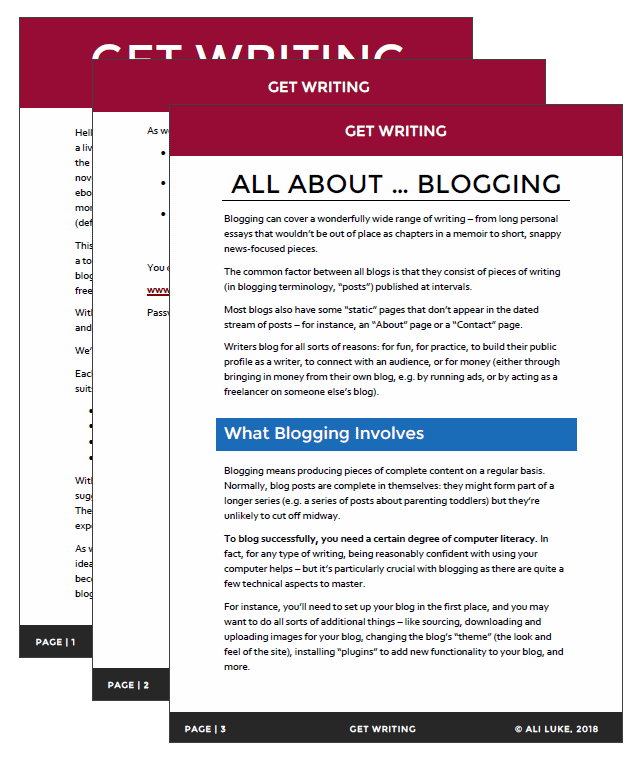How to Write When … You Feel Like You’re Not Good Enough

I’m restarting the “How to Write When…” series from last year. You might want to take a look at some/all of the previous posts, too: How to Write When … You Don’t Feel Inspired; How to Write When … You Have Kids; How to Write When … You Keep Getting Interrupted; How to Write When … Your World is Upside Down.
Do you ever feel like you’re just not good enough as a writer?
Maybe you’re worried that your characters seem flat and two-dimensional. Perhaps your plots seem hackneyed or contrived.
Maybe you think you should be making money (or more money) from your writing. Perhaps you’ve been writing, or trying to, for many years now … but you feel like you haven’t made much progress.
I don’t think I’ve ever met a writer who felt 100% confident about their writing. I used to think that confidence would just come over time, but (having heard plenty of amazing writers talk about their process!) … I know that even as you get better at writing, you just become able to stop more areas where you could improve.
If you don’t feel like you’re a good enough writer, here are some practical things you can do:
#1: Stop Aiming for Perfection
As a writer, it’s easy to be a bit of a perfectionist. You might end up tweaking sentences all day long, only to make very little actual progress.
The thing is, “good writing” is ultimately pretty subjective. One person’s “trashy beach novel” is another person’s “five-star gripping read”.
You won’t please everyone. And if you try to ensure that your writing is perfect, chances are, you’ll never even finish.
Over the past few years, I’ve been in a local science fiction book group, reading a wide range of classic and modern SF. I don’t think I’d describe any of the books we’ve read as “perfect” … but I’ve very much enjoyed them all. Yes, occasionally the pacing of a story has seemed a little off, or the characterisation hasn’t quite rung true, or the “science” of the science fiction has been a bit lacking – but all those are overshadowed by the enjoyment of the story, ideas, and/or writing as a whole.
#2: Keep Track of Your Successes
It’s all too easy to focus on the next writing goal, or on a really big long-term goal, without acknowledging all your progress along the way.
Make a deliberate effort to track your successes, such as:
- Receiving positive feedback on your writing from a friend or tutor
- Having a short story published, or shortlisted in a competition
- Having an article accepted for a website
… and so on. For more ideas, check out Nine Writing Milestones to Celebrate (and Aim For).
Even if your successes feel small or infrequent right now, they still count. In a year, you’ll be able to look back and see how they added up over time.
#3: Decide That You’ll Write Anyway
You have every right to write … whether or not you’re any good.
Writing time isn’t some privilege you need to earn. You’re allowed to write badly – deliberately badly, if you want!
I’m terrible at dancing, but I’ll still happily dance to 80s rock with my kids in the living room. (I do usually draw the curtains first…)
If you love writing, you can write as a hobby, just for fun. There’s nothing at all wrong with that.
#4: Focus on Writing the First Draft
When you’re starting a new project, or progressing with a big one, it’s easy to get a bit caught up in wanting every word to be just right.
Remember, you’re just writing a first draft. You can go through plenty of rounds of edits after it’s written … but you do need to get that first draft down on paper first.
Often, I’ll write a “scrappy draft” of something when I’m not feeling confident, or when I’m working on a project that I’ve picked up and put down a lot. I turn my focus to just getting through to The End … even if that means leaving plenty of rough edges along the way.
#5: Set Aside Time to Write Regularly
If you feel like your writing isn’t good enough, it’s really hard to make writing time a priority in your life. But if you’re never making time to write, that can really knock your confidence too.
However you feel about your writing, set aside some time to write regularly. This doesn’t need to be a lot of time: an hour every weekend might be what you can realistically achieve right now.
For help fitting writing into your week, check out Supercharge Your Writing Week. This ebook comes with several printables to help you make space in your life for writing.
#6: Deliberately Practice Things You Struggle With
All writers have weak areas and strong areas. It’s a good idea to play to your strengths as much as possible: e.g. if you know you’re great at humorous dialogue, then you might want to write lighthearted comedy rather than hard-hitting crime novels.
However, there’ll likely be some areas where you need to brush up some specific skills as part of your projects. The best way to improve is to deliberately practice, perhaps by doing writing exercises, or by carefully analysing what works (and doesn’t) in what you read.
You might want to start by taking a look at What if You’re Just Not Good Enough to Be a Successful Writer? – in that post, I have specific examples of writing that needs polishing up a bit.
#7: Seek Feedback to Help You Improve
Getting direct feedback on your writing is the fastest way I know of to improve as a writer.
It can be very hard to “see” your work until you get an extra pair of eyes on it. Someone fresh to your piece may spot problems that you missed – and conversely, they may well point out things that are working really well, that you might have discounted.
There are lots of different ways to get feedback on your work. I found writers’ workshop groups invaluable in my first few years of writing. Facebook groups, online forums, beta readers, and writing coaches or mentors are all great options too.
Ultimately, if you were already at your full potential as a writer, that would be hugely disappointing. It’d mean that you would never grow any further or learn anything new about writing during the rest of your life.
All writers are continually improving: as Ernest Hemingway put it, “We are all apprentices in a craft where no one ever becomes a master.”
If you give up writing now because you feel you’re not “good enough” … you’ll never be able to progress any further. So write, regardless of (or in defiance of!) your worries that you’re not good enough. However good – or not – you objectively are, the only way to get better is to keep writing.

Want to try out a new area of writing, or go further with a type of writing that you’re already enjoying? Take a look at Get Writing: it’s a pack of four mini-guides, plus a whole bunch of useful extras, to help you dig deep into short stories, novels, freelancing, or blogging.
It’s on half-price sale until the end of this (Friday 5th February) and I’m also throwing in a bonus ebook until then, too, called Get Inspired, Get Creative, Get Writing. Check out all the details on the Get Writing page here.
About

I’m Ali Luke, and I live in Leeds in the UK with my husband and two children.
Aliventures is where I help you master the art, craft and business of writing.
Start Here
If you're new, welcome! These posts are good ones to start with:
Can You Call Yourself a “Writer” if You’re Not Currently Writing?
The Three Stages of Editing (and Nine Handy Do-it-Yourself Tips)
My Novels

My contemporary fantasy trilogy is available from Amazon. The books follow on from one another, so read Lycopolis first.
You can buy them all from Amazon, or read them FREE in Kindle Unlimited.

0 Comments